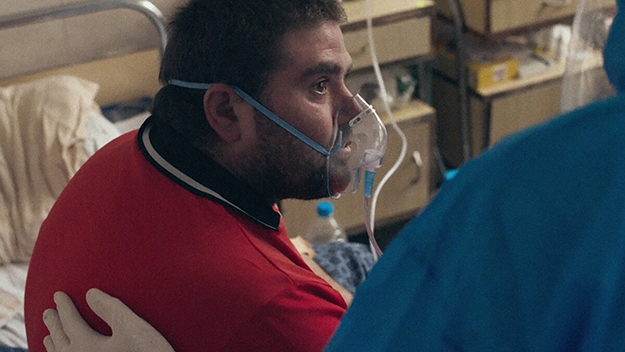Deep Breath: Karlovy Vary International Film Festival 2022
This article appeared in the July 26, 2022 edition of The Film Comment Letter, our free weekly newsletter featuring original film criticism and writing. Sign up for the Letter here.

A Provincial Hospital (Ilian Metev, Ivan Chertov, and Zlatina Teneva; 2022)
Karlovy Vary is a distinctive setting for a film festival. Located about 60 miles west of Prague, the green, heavily forested Czech spa city features long rows of colorful, picturesque buildings clustered like flowers along either side of the river Teplá. In the center of town is the Hotel Thermal, an imposing concrete complex that has been the main site of the Karlovy Vary International Film Festival since 1977. I’ve been to the festival twice, and on both trips I’ve spent a large amount of time just gazing up at this brutalist building—a stark, almost alien structure that looks like it could, at any minute, rocket into the sky like the tower blocks in Jia Zhangke’s Still Life, leaving a empty crater in the middle of the city.
After a canceled 2020 edition and a somewhat sparse 2021 festival, KVIFF’s 56th edition was, with over 10,000 attendees, the first that was patently “post-pandemic.” Yet the two best films in the lineup—both documentaries about disease—dwelled in the two years that were. One was Mladen Kovačević’s Another Spring, which played in the new Proxima section, described by the festival as a home for films with adventurous formal approaches. Tracking the progression of the 1972 outbreak of smallpox in the former Yugoslavia, Another Spring is a straightforward, all-archival film, combining narration from Zoran Radovanović––a doctor who was integral to national efforts to eradicate the disease––with gorgeously grainy, if often grisly, footage and an effective soundtrack of eerie, warbling drone music. Though the film never says why the outbreak was so well-documented and scrupulously archived, Kovačević evidently had a wealth of quality material to repurpose. News coverage, landscape footage, home videos, and medical films showing an array of queasy closeups of lesions and sores are spliced together into an almost music video–like montage that creates a mood of mounting horror.
Taking the form of a procedural, the film provides a gripping chronology of the virus’s transmission, before detailing the government’s response: tight contact tracing and containment, and a rapidly implemented mass vaccination program. Kovačević explores how scientific precision and bureaucratic efficiency, combined with international diplomacy, ensured that one of history’s most fatal diseases “ceased to exist as a result of human cooperation,” as Radovanović puts it in his concluding summation. While the role played by an authoritarian government in this success goes mostly unmentioned, the film remains interesting as a reference for what an effective response to an outbreak of an infectious disease looks like: the epidemic resulted in 175 cases and 35 deaths in Yugoslavia, and was over in three months.
The same cannot be said for the situation documented in A Provincial Hospital, directed by Ilian Metev, Ivan Chertov, and Zlatina Teneva, which competed for the festival’s main prize, the Crystal Globe. Set in a COVID-19 ward in a small town in Bulgaria during late 2020, the film depicts long and protracted suffering. Patients struggle not only to breathe but to sustain the mental fortitude needed to make it through a debilitating illness, while the hospital staff confront exhaustion and depression. The filmmakers watch quietly, assembling their intimate, not-quite-fly-on-the-wall observations—in one scene, a nurse urges the cameraperson to stop watching uselessly and help out with the heavy lifting—into a narrative in which desperation, despair, and frustration are constant. In a particularly candid moment, the ward’s chief doctor takes severe measures when a patient in critical condition starts refusing oxygen. Rather than let him die, the doctor decides to force treatment, tearfully threatening to handcuff the patient while muttering about how he never agreed to be “a policeman.”
The drudgery is punctuated by frequent displays of humility and human resilience, showing how black humor works to bring together people of “differing character,” as a patient puts it. (One sequence shows a doctor and a patient exchanging increasingly bad jokes based on stereotypes about Bulgarian society.) There are no great heroics on show here, only simple persistence and patience––not just on the part of the doctors and the patients, but also the filmmakers, who are often able to land on grace notes after long and evidently strenuous stretches of shooting. A Provincial Hospital concludes on an upbeat note which feels resonant, as a man who seemed sick beyond hope makes a small step toward recovery, standing up to stumble toward a window for a glimpse of the outside.
Stepping out of the theater and into the streets of Karlovy Vary, I found it odd to think that we were only 18 months and 700 miles from the events documented in the film. This year’s KVIFF coincided with a Czech national holiday, and outside, the swimming pools were crowded, the parks were packed, the bars and restaurants were buzzing, and beautifully trashy bass-boosted house and Eurodance music was blasting from massive sound systems installed in every public square or quarter. The sobering distance between the somber worlds captured in the two epidemiological documentaries and the vitality of the sun-soaked party city in which they’d debuted left a deep impression on me, reminding me of the ongoing precarity of communal celebrations of cinema.
Matt Turner is a writer based in London, U.K.







